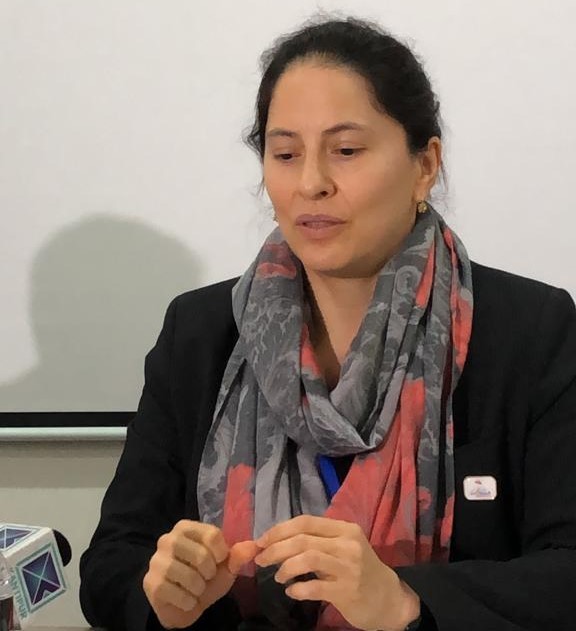IMF projects Nepal's economic growth to be around 6% in this fiscal

By A Staff Reporter, Kathmandu, Jan. 17: The International Monetary Fund (IMF) has projected that Nepal’s economy would grow by around 6 per cent in the current fiscal year 2019/20.
The estimate is down by 2.5 per cent from the 8.5 per cent projection made by the government.
“Economic growth is expected to remain healthy but moderate to around 6 percent in FY 19/20 amid slower growth in India, sluggish remittances, and weaker agricultural production. In this context, there has been a welcome narrowing of the current account deficit, stabilization of gross official reserves, and slower credit growth,” said Laura Jaramillo, Deputy Division Chief of Asia and Pacific Department at the IMF.
Speaking at a press conference organised at the Nepal Rastra Bank to share the conclusion of the consultation, she said that there were signs of moderation in the current fiscal year. The IMF mission also expected 6 per cent inflation driven mainly by food inflation.
Jaramillo is leading an IMF team to Nepal to hold discussions for the 2020 Article IV consultation. The team held discussion with Minister of Finance Dr. Yuba Raj Khatiwada, Nepal Rastra Bank Governor Dr. Chiranjibi Nepal and other high-level government officials, as well as representatives from the private sector and development partners from January 5 to 17.
She said that the country’s economy has been growing well above its long-term average in the last few years supported by greater political stability, improved electricity supply, and reconstruction activity following the devastating earthquake in 2015.
However, additional policies are needed to continue to support inclusive growth, while safeguarding macroeconomic and financial stability, she said.
According to Jaramillo, fiscal policy should remain prudent, and the transition to fiscal federalism carefully managed. Macro-prudential measures should remain in place to limit the buildup of financial sector risk and recent reforms to boost foreign investment need a supportive implementation environment.
The mission has appreciated the recent upgrades to tax administration and efforts in public financial management, and recommended for further steps from the government to ensure that spending was of high quality and executed in a timely manner.
“To protect fiscal sustainability, the overall expenditure envelope of subnational governments needs to be aligned with available funding, with tight limits on any subnational borrowing,” said Jaramillo.
She also appreciated NRB’s implementation of macro-prudential measures to limit the buildup of systemic risk in the financial sector.
The recent regulatory requirement for banks to cross-check corporate borrowers’ financial information against the recently launched Integrated Tax System is expected to facilitate more prudent risk assessment by banks, she said.
She also said that the NRB’s policy of activating the countercyclical capital buffer that will require banks to increase their level of capital by July 2020 was appropriate.
“The NRB should continue to closely monitor asset quality of banks and improve monitoring of concentration risk,” she said.
She suggested that the central bank should put in place a well-functioning interest rate framework that reduces volatility in short-term interest rates.
“This would allow the NRB to improve financial market development as well as policy signaling and transmission,” said Jaramillo.
‘Nepal capable for risk management’
Meanwhile, Finance Minister Dr. Yuba Raj Khaiwada has said that Nepal was capable of managing the potential risk to the economy.
“Before reaching to any conclusion, the regional scenario and economic downturn in the south Asian countries, and its impact on Nepal should be taken into consideration,” he said while speaking at the IMF Article IV consultation meeting earlier on Friday.
He said that the most of the indicators were positive. “We have signed agreements for projects worth US$ 1 billion, some of them are ready for implementation. Similarly, some large projects will be completed by the end of this fiscal and some large projects are ready to take off,” he said to the mission.
Recent News

Do not make expressions casting dout on election: EC
14 Apr, 2022
CM Bhatta says may New Year 2079 BS inspire positive thinking
14 Apr, 2022
Three new cases, 44 recoveries in 24 hours
14 Apr, 2022
689 climbers of 84 teams so far acquire permits for climbing various peaks this spring season
14 Apr, 2022
How the rising cost of living crisis is impacting Nepal
14 Apr, 2022
US military confirms an interstellar meteor collided with Earth
14 Apr, 2022
Valneva Covid vaccine approved for use in UK
14 Apr, 2022
Chair Prachanda highlights need of unity among Maoist, Communist forces
14 Apr, 2022
Ranbir Kapoor and Alia Bhatt: Bollywood toasts star couple on wedding
14 Apr, 2022
President Bhandari confers decorations (Photo Feature)
14 Apr, 2022











